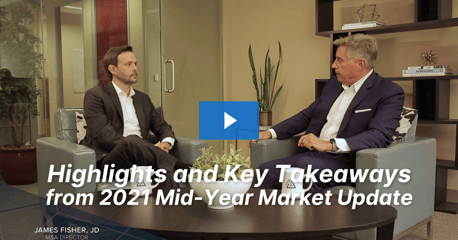Blog
Select Topic:
Posted by FP Transitions on June 20, 2023
Defining Your Enterprise: What Are You Building?
For our clients, the courses of action may differ, but growth is the number one priority. The goal could be to grow and then sell it to a third party for maximum value. Alternatively, the aim could be to create a sustainable enterprise capable of...
Posted by FP Transitions on February 17, 2022
Continuity Partner Matching, a Benefit of EMS™ Professional
Recently, a client told us that since she had implemented a formal continuity plan, her clients have felt more comfortable adding assets to their portfolios now that their tenure with her business is protected. This stability of continuity is an...
Posted by FP Transitions on August 9, 2021
Mid-Year Market Update - Key Insights
Last month our M&A Director James Fisher, JD and CEO Brad Bueermann delivered our 2021 Mid-Year Market Update and explored marketplace activity for the first half of 2021.
We all know that 2020 was a truly unique year on all fronts. The financial...
Posted by FP Transitions on July 26, 2021
From Insight to Implementation: A Strategic Path to Business Success
We know it’s common to focus on getting a new client by sharing just enough information to win the sale. Often, that comes down to a quick diagnosis based on what thesalesperson wants to sell, rather than what the client truly needs.
We don’t do...
Posted by FP Transitions on July 16, 2020
The Four Greatest Opportunities for Financial Advisors
Today’s Independent financial advisors face an endless array of challenges and opportunities. Identifying challenges before they arise is key for finding solutions and developing strategies for tackling the issues that present the greatest...
Posted by Stuart Smith, JD on March 11, 2020
Structuring Ownership Compensation
Professionals working in the independent financial services industry tend to organize their business the same way as other professional service providers. Whether a dentist, lawyer, or wealth advisor, chances are that the firm owner is both a...
Posted by FP Transitions on February 21, 2020
Financing for Successors
Your principal advisor has invited you to become an owner. Congratulations! The majority of next-generation advisors are energized by the demand for and the opportunity of succession planning, but most founders are stalled leaving successors...
Posted by FP Transitions on November 13, 2019
Targeted Growth Solutions for Financial Advisors - FREE eBook Download
Today’s independent financial advisors face an endless array of opportunities (and challenges). The key is to identify impediments before they arise and to develop strategies for tackling the issues that present the greatest opportunities for...
Posted by FP Transitions on November 7, 2019
Elevating a Legacy : A G2 Success Story
In our first book “Succession Planning for Financial Advisors,” founder David Grau Sr., JD recounted one advisor’s early succession journey, including his ownership team’s bumps and triumphs as they executed the first tranches of their plan. Today,...
Posted by FP Transitions on October 23, 2019
Next-Gen Impact
The sustainability of financial services businesses depends on the incorporation of new talent. The demand for next-generation talent continues to increase as longevity, continuity, and staying competitive become top priorities for many financial...
Posted by FP Transitions on October 21, 2019
NEW Roundtable Talk - G2 Perspectives : Cultural Fit and the Ownership Mentality
In this Roundtable Talk, the next-generation ownership of FP Transitions discuss their own experiences in taking the mantle to shape the team and future of the business. They explore hiring for cultural fit and potential value, the definition of...
Posted by FP Transitions on October 8, 2019
Entrepreneurs Need Intrapreneurs
We all know what an entrepreneur is. Many independent financial advisors would likely identify themselves as an entrepreneur.
Many entrepreneurs worked 18-hour days to get their business off the ground and wore all the hats in the company–CEO,...
/Blog%20-%20Defining%20Your%20Enterprise%20What%20are%20you%20building%20(Refresh%20Banner)%20.png?width=458&height=280&name=Blog%20-%20Defining%20Your%20Enterprise%20What%20are%20you%20building%20(Refresh%20Banner)%20.png)










%20-%20Entrepreneurs%20Need%20Intrapreneurs/Blog%20Social%20-%20Entrepreneurs%20Need%20Intrapreneurs.png?width=458&height=280&name=Blog%20Social%20-%20Entrepreneurs%20Need%20Intrapreneurs.png)